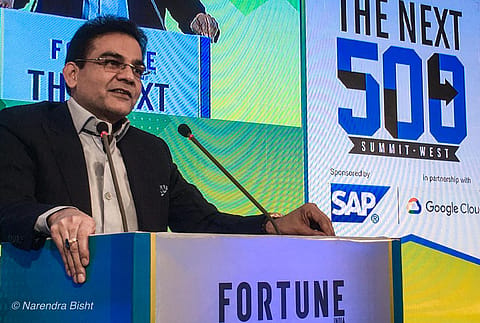The ambitious aren’t limited by resources: B.K. Goenka
The self-made business leader stressed on the merits of commitment, customer focus, and ambition to rise to the top as key contributors to entrepreneurial success.

When B.K. Goenka, chairman of the $3-billion Welspun Group—which has interests ranging from home textiles to steel pipes and infrastructure—went to meet a potential client in Machester, U.K., for the towels the company was making at its newly commissioned factory in India in 1993, he was in for a rude shock. The person at the other end of the table told him bluntly that “you Indians show something and deliver something else,” Goenka recounted while delivering the keynote address at the Fortune India The Next 500 Summit–West, in Mumbai on August 27.
“I was really hurt by what the gentleman said and decided that we needed to do something to prove this perception wrong,” Goenka told an audience comprising senior leaders from India’s largest midsize companies. That is when Welspun, then a small textile company that Goenka founded in 1985 with ₹25 lakh, decided on what its business philosophy was going to be: ‘Dare to Commit’. Subsequently, it took the pains of shipping samples of the towels it made by air to prospective clients all over the world to prove their worth, and eventually landed some of the most well-known retailers in the world, including Walmart, Macy’s, Bed Bath and Beyond, Costco, JCPenney, Carrefour, Debenhams, and Tesco.
In 2006, life came full circle for Goenka when his company acquired the Manchester-based company that had rebuffed Welspun’s business proposition. The company in question was the haloed Christy’s of the U.K., which caters with its home textiles to the British royal family and also holds the licence to supply towels used by the likes of Roger Federer and Rafael Nadal during their annual tennis matches at Wimbledon. At present, Welspun, which does around a billion dollars of home textiles exports from India each year, accounts for every fifth towel and seventh bedsheet sold in the U.S.
Goenka believes the key ingredients for entrepreneurial success are unwavering commitment to whatever one chooses to do, aspiration to achieve a leadership position in the vertical in which one does business, customer-centricity, and ambition.
“If you don’t love what you are doing, you will not succeed,” Goenka advised growing companies. “Second, whatever you do, you need to think of achieving a leadership position. You don’t have to grab the world, but whatever piece of the world you want to grab, have a dominant position there; try and be among the top three players in that space.”
The 53-year-old business leader, who is also the president of the Associated Chambers of Commerce and Industry of India (ASSOCHAM), said young entrepreneurs who have their own startups these days are busy chasing valuation. But what they sometimes forget is that valuation will naturally follow if businesses are obsessed with creating value for their customers. This is what his over three-decade-long entrepreneurial career has taught him, he said. And it is this customer-centricity which has helped Welspun carve a niche for itself in whatever business it chose to expand into subsequently, like steel pipes that it supplies to the top oil and gas companies in the world, including Exxon, Chevron and Saudi Aramco; and infrastructure, wherein it built the first road project under the central government’s new hybrid annuity scheme and delivered it 12 months ahead of schedule.
Finally, Goenka observed that ambition was the biggest factor in helping entrepreneurs succeed. “It is one of the most important ingredients for success. You are not limited by resources when you are ambitious,” Goenka said. That he has put ambition to good use is evident from the fact that Goenka, who was born into a family of foodgrain traders in Hissar, Haryana, moved away from the family business to start something on his own at the young age of 18. Hailing from a Hindi-speaking background, Goenka says that limited knowledge of English was a big handicap for him when he moved to Mumbai in search of opportunities.
Recommended Stories
But Goenka, who speaks English well now, clearly let his ambition and business acumen do the talking and created, in the process, a business empire valued at $1.3 billion.